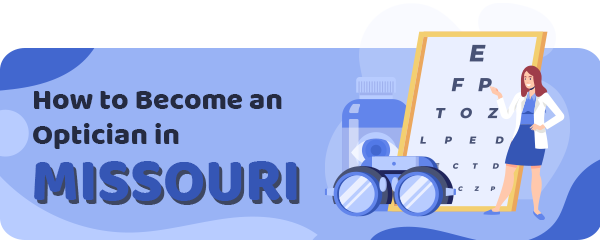Starting a career as an optician in Missouri might feel like navigating uncharted territory.
If you want to learn the steps to becoming a successful optician in this state, read on for more info.
Article Table of Contents
Optician Job Duties
Thriving in a consumer-driven society hinges on businesses maintaining a consistent influx of customers, a task facilitated by the indispensable role of a skilled optician.
A proficient optician doesn’t merely ensure the loyalty of existing clientele but also possesses the knack for attracting new patrons.
Beyond cultivating customer relationships, this professional adeptly handles a spectrum of daily responsibilities, including:
- Precise fitting of eyeglasses and contact lenses
- Assisting clients in selecting the perfect frame
- Maintaining meticulous inventory and sales records
- Expertly interpreting prescriptions
- Resolving issues like repairing broken frames
- Ensuring a customized and comfortable fit through eyeglass adjustments
- Monitoring and coordinating order fulfillment
While these duties represent a substantial portion of an optician’s responsibilities, they are by no means exhaustive.
It’s crucial to note that aspiring opticians must acquire a specialized diploma specifically for dispensing contact lenses, underscoring the importance of specialized training in this dynamic field.
Optician Training in Missouri
In the realm of specialized training, Missouri provides options for those pursuing optometry-related courses, with notable schools listed below.
Three Rivers Community College 
This college offers a pre-optometry training program.
The program allows students to then transfer to the University of Missouri St. Louis (UMSL).
Here, they will be eligible to enroll in the doctorate optometry doctorate.
The program will prepare the students for the Optometry Admission Test (OAT), which is composed of these tests:
- Survey of the Life Sciences
- This test covers biology, general chemistry, and organic chemistry
- Reading Comprehension,
- Physics,
- Quantitative Reasoning
University of Missouri 
The training program you can attend at this university has a duration of 4 years.
It leads to the Doctor of Optometry (O.D.) degree thanks to the Accreditation Council on Optometric Education (ACOE).
The program has more than 170 students who now benefit from a renovated Patient Care Center where teaching labs, study, and lounge spaces can be found.
However, a class has under 50 students, allowing a teacher to pay closer attention to 8 students when needed.
| School Name | Address |
|---|---|
| Three Rivers Community College | 2080 Three Rivers Blvd, Poplar Bluff, Missouri 63901 |
| University of Missouri | One University Boulevard, Saint Louis, Missouri 63121-4400 |
Being a public college, the tuition is reasonable, and the program spans 2 years.
For a broader range of career opportunities, explore the Doctorate program in optometry at the University of Missouri.
This comprehensive 4-year degree program, while being offered by a public college, has a slightly higher tuition.
It’s worth noting that opting for online learning or considering colleges from other states is a viable approach to optician training.
Most schools maintain specific admission criteria, generally requiring candidates to:
- A high school diploma or GED
- Completing specific classes with a minimum grade of C
- 2 letters of recommendation
- OAT scores – not older than 5 years
- Minimum GPA of 2.75
The training curriculum encompasses diverse classes, and a snapshot of the courses includes:
- Introduction to Optometry
- Ocular Anatomy
- Systems 1: Neuroscience
- Ocular Microbiology
- Ophthalmic Imaging
- Public Health Optometry
- Glaucoma
- Physics
- Math,
- English
For those seeking an alternative route, apprenticeships in Missouri offer a practical hands-on approach, typically lasting around 2 years.
Certification or Licensure for an Optician in Missouri
While there is no legislative compulsion for individuals to seek licensure, an alternative certification recognized statewide is available.
Issued by the Board of Optometry, aspiring individuals must adhere to the following requirements:
- Graduate from an accredited optometry training program
- Successfully pass the Missouri Optometric Law exam
- Possess certification for the use of pharmaceutical agents
- Achieve success in both the ABO and NCLE exams
The Missouri Optometric Law exam requires a passing score of 75%, and the results must not exceed a 12-month timeframe.
The ABO and NCLE exams, each priced at around $200, offer three levels of difficulty:
- Beginner,
- Intermediate
- Advanced.
ABO exam subjects encompass:
- Reading prescriptions,
- Fitting and dispensing spectacles
- Using standard ophthalmic equipment
NCLE examination evaluates candidates on:
- Pre-fitting for lenses,
- Diagnostic fitting,
- Dispensing of lenses,
- Patient education,
- Delivery
- Follow-up
Candidates must secure a minimum score of 70% to successfully pass the ABO-NCLE tests, thus establishing their proficiency in the field.
Optician Certification Renewal
Those with a Novice certification are obligated to undergo renewal every three years.
This involves the successful completion of a set of ongoing education courses along with the payment of the renewal fee.
Upon successfully renewing your credential at least once, the opportunity arises to progress to the status of an Advanced Optician.
To attain this, you must fulfill the following criteria:
- Accumulate 3 years of practical experience
- Maintain the foundational certification.
Optician Salary in Missouri
In Missouri, opticians make about $50,600 a year.
The median optician salary stands at around $53,100 per year.
To learn more about this, check out the table below highlighting cities in Missouri where one might find good career opportunities.
It’s essential to bear in mind that multiple factors come into play, such as the place you live and how much experience you have.
Annual Salary Range:| Location | Avg. Annual Salary |
|---|---|
| Saint Louis | $52,300 |
| West Alton | $52,100 |
| Saint Peters | $51,900 |
| Bismarck | $51,800 |
| Adrian | $51,600 |
| Weston | $51,500 |
| Shelbyville | $50,900 |
| Ashburn | $50,900 |
| Unionville | $50,800 |
| Sheridan | $50,100 |
Regional Salary in Missouri
| Region | Employed | Avg. Annual Salary | Avg. Hourly Pay | Top 10% Annual Salary | Bottom 10% Annual Salary |
|---|---|---|---|---|---|
| Cape Girardeau, MO-IL | 60 | $38,020 | $18.28 | $46,160 | $29,450 |
| Columbia, MO | 60 | $44,650 | $21.47 | $50,600 | $30,160 |
| Jefferson City, MO | 30 | $37,900 | $18.22 | $43,990 | $29,900 |
| Joplin, MO-KS | 60 | $39,820 | $19.14 | $47,570 | $30,020 |
| Kansas City, MO-KS | 550 | $44,940 | $21.60 | $53,100 | $34,280 |
| St. Louis, MO-IL | 810 | $45,880 | $22.06 | $55,580 | $33,530 |
| Springfield, MO | 190 | $45,090 | $21.68 | $51,830 | $30,720 |
* Employment conditions in your area may vary.
Frequently Asked Questions
How can I stay updated on changes to the regulations regarding opticians in Missouri?
Many organizations change their rules and regulations.
Here are some institutions that can help you stay up-to-date with changes in the industry:
- American Board of Opticianry (ABO) and National Contact Lens Examiners (NCLE)
- Association of Regulatory Boards of Optometry
- Association of Schools and Colleges of Optometry
- Board of Registration in Optometry
- Commission on Opticianry Accreditation
- Missouri Assistive Technology
- Missouri Optometric Association
- Missouri Society of Eye Physicians and Surgeons
What are the skills needed by an optician in Missouri?
Opticians have the following abilities:
- Attention to details
- Good communication skills
- Adaptable to new situations
- Business skills
- Physical stamina
- Ability to perform repetitive tasks
Where can I find work as an optician in Missouri?
In Missouri, these are the place where you can find a job as an optician, once you are certified:
- Stores
- Offices
- Optometry practices
- Hospitals
- Clinics
Read the full guide: How to Become an Optician


